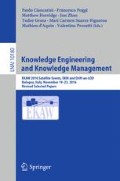Abstract
Systematic review, a form of evidence synthesis that critically appraises existing studies on the same topic and synthesizes study results, helps reduce the evidence gap. However, keeping the systematic review up-to-date is a great challenge partly due to the difficulty in interpreting the conclusion of a systematic review. A promising approach to this challenge is to make semantic representation of the claims made in both the systematic review and the included studies it synthesizes so that it’s possible to automatically predict whether the conclusion of a systematic review changes given a new study. In this dissertation work, we developed a taxonomy to represent knowledge claims both in systematic review and its included studies with the goal of automatically updating a systematic review. We then developed machine learning models to automatically predict a synthesized claim from claims in individual studies.
Access this chapter
Tax calculation will be finalised at checkout
Purchases are for personal use only
Notes
References
Bastian, H., Glasziou, P., Chalmers, I.: Seventy-five trials and eleven systematic reviews a day: how will we ever keep up? PLoS Med. 7, e1000326 (2010)
Ioannidis, J.P.: Why most published research findings are false. PLoS Med. 2, e124 (2005)
Burns, P.B., Rohrich, R.J., Chung, K.C.: The levels of evidence and their role in evidence-based medicine. Plast. Reconstr. Surg. 128, 305–310 (2011)
Koch, G.: No improvement–still less than half of the Cochrane reviews are up to date. In: XIV Cochrane Colloquium, Dublin (2006)
Garritty, C., Tsertsvadze, A., Tricco, A.C., Sampson, M., Moher, D.: Updating systematic reviews: an international survey. PLoS ONE 5, e9914 (2010)
Cohen, A.M., Hersh, W.R., Peterson, K., Yen, P.-Y.: Reducing workload in systematic review preparation using automated citation classification. J. Am. Med. Inform. Assoc. 13, 206–219 (2006)
Cohen, A.M., Smalheiser, N.R., McDonagh, M.S., Yu, C., Adams, C.E., Davis, J.M., Yu, P.S.: Automated confidence ranked classification of randomized controlled trial articles: an aid to evidence-based medicine. J. Am. Med. Inform. Assoc. 22, 707–717 (2015)
Blake, C., Lucic, A.: Automatic endpoint detection to support the systematic review process. J. Biomed. Inform. 56, 42–56 (2015)
Kilicoglu, H., Demner-Fushman, D., Rindflesch, T.C., Wilczynski, N.L., Haynes, R.B.: Towards automatic recognition of scientifically rigorous clinical research evidence. J. Am. Med. Inform. Assoc. 16, 25–31 (2009)
Marshall, I.J., Kuiper, J., Wallace, B.C.: RobotReviewer: evaluation of a system for automatically assessing bias in clinical trials. J. Am. Med. Inform. Assoc. 23, 193–201 (2016)
Lai, N.M., Teng, C.L., Lee, M.L.: Interpreting systematic reviews: are we ready to make our own conclusions? A Cross Sect. Study BMC Med. 9, 30 (2011)
Boutron, I., Dutton, S., Ravaud, P., Altman, D.G.: Reporting and interpretation of randomized controlled trials with statistically nonsignificant results for primary outcomes. JAMA 303, 2058–2064 (2010)
Elliott, J.H., Turner, T., Clavisi, O., Thomas, J., Higgins, J.P., Mavergames, C., Gruen, R.L.: Living systematic reviews: an emerging opportunity to narrow the evidence-practice gap. PLoS Med. 11, e1001603 (2014)
Slaughter, L., Berntsen, C.F., Brandt, L., Mavergames, C.: Enabling living systematic reviews and clinical guidelines through semantic technologies. D-Lib Mag. 21, 8 (2015)
Cohen, A.M., Ambert, K., McDonagh, M.: Cross-topic learning for work prioritization in systematic review creation and update. J. Am. Med. Inform. Assoc. 16, 690–704 (2009)
Shekelle, P.G., Motala, A., Johnsen, B., Newberry, S.J.: Assessment of a method to detect signals for updating systematic reviews. Syst. Rev. 3, 13 (2014)
Mavergames, C., Oliver, S., Becker, L.: Systematic reviews as an interface to the web of (trial) data: using PICO as an ontology for knowledge synthesis in evidence-based healthcare research (2013)
de Waard, A., Buckingham Shum, S., Carusi, A., Park, J., Samwald, M., Sándor, Á.: Hypotheses, evidence and relationships: the HypER approach for representing scientific knowledge claims (2009)
Blake, C.: Beyond genes, proteins, and abstracts: identifying scientific claims from full-text biomedical articles. J. Biomed. Inform. 43, 173–189 (2010)
Clark, T., Ciccarese, P.N., Goble, C.A.: Micropublications: a semantic model for claims, evidence, arguments and annotations in biomedical communications. J. Biomed. Semant. 5, 1 (2014)
Acknowledgement
The author would like to thank Professor Catherine Blake and Professor Jodi Schneider for their guidance and support in writing this paper.
Author information
Authors and Affiliations
Corresponding author
Editor information
Editors and Affiliations
Rights and permissions
Copyright information
© 2017 Springer International Publishing AG
About this paper
Cite this paper
Guo, J. (2017). Extracting Knowledge Claims for Automatic Evidence Synthesis Using Semantic Technology. In: Ciancarini, P., et al. Knowledge Engineering and Knowledge Management. EKAW 2016. Lecture Notes in Computer Science(), vol 10180. Springer, Cham. https://doi.org/10.1007/978-3-319-58694-6_37
Download citation
DOI: https://doi.org/10.1007/978-3-319-58694-6_37
Published:
Publisher Name: Springer, Cham
Print ISBN: 978-3-319-58693-9
Online ISBN: 978-3-319-58694-6
eBook Packages: Computer ScienceComputer Science (R0)

